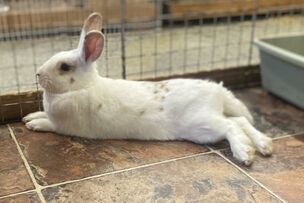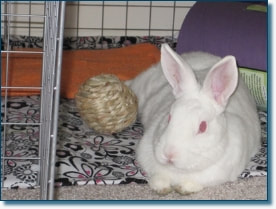Caring for Your Rabbit - First Days at Home

Rabbits are prey animals. This shapes just about everything in their lives. Understanding the implications of this takes you a long way to understanding your bunny. Rabbits are shy until they learn to trust you and their environment. Once they do, they’ll enjoy interacting with you. But at first, you need to give them time and space to learn that you are safe. Sit on the floor and let him/her come up to you - don’t reach for them and avoid picking them up. From a rabbits' point of view, someone reaching for them or children running after them feels like they've been “caught”. It’s in their nature that being caught is a bad thing. So, take it slow and gentle while your new bunny gets to know you. It will speed up the process of learning to trust you.

Make your bunny's pen a sanctuary - somewhere they can go to feel safe and be left along. Don't reach into the pen and bring them out; let your rabbit come out on its own. Don't clean the pen when your rabbit is in it; do so when they're out running around. Your rabbit needs a place of their own. They will feel safer in general, and thus will more quickly interact with you. And their personality will be fully revealed to you, because your rabbit will feel safe to do so.
Remember that everything has just changed for your new rabbit. Their home, all the smells and sounds are gone. Now there are new smells, sounds and a home. Be very patient with them. Let them be in charge with how much you interact. Don't be discouraged if they aren't very interactive with you for the first several days or week. Once your rabbit learns you are safe, their natural curiosity will bring him/her to you.
We recommend that for the first week or two you restrict your new bunny to a pen and a limited exercise area, immediately outside the pen. You can sit in the exercise area and let him/her come up to you. Then, give your bunny a small treat as a reward, such as their pellets or other timothy-based treats. They’ll learn that despite the fact that you're huge and smell funny, you are a good person! (Don’t over-do it will the treats, however!) Sit with them when you're reading or watching television. You’ll be able to tell when he or she is getting comfortable with you.
Once your rabbit is established in your home, and is used to using the litter box, gradually provide more space in which to run and exercise. For example, let your rabbit have the run of the room in which you have the pen - but block the door so they have access to only that room. They'll want to explore the entire room and will probably mark it by urinating or pooping a bit - just clean it up and know that litter habits will improve (and read the section on Litter Training in our Housing Section.)
Many children want to hold and cuddle your new rabbit. They’re so cute, after all. However, many rabbits aren’t going to enjoy being held, especially when they don’t know you. You’ll need to teach your children to be gentle and patient with your bunny.
Remember that everything has just changed for your new rabbit. Their home, all the smells and sounds are gone. Now there are new smells, sounds and a home. Be very patient with them. Let them be in charge with how much you interact. Don't be discouraged if they aren't very interactive with you for the first several days or week. Once your rabbit learns you are safe, their natural curiosity will bring him/her to you.
We recommend that for the first week or two you restrict your new bunny to a pen and a limited exercise area, immediately outside the pen. You can sit in the exercise area and let him/her come up to you. Then, give your bunny a small treat as a reward, such as their pellets or other timothy-based treats. They’ll learn that despite the fact that you're huge and smell funny, you are a good person! (Don’t over-do it will the treats, however!) Sit with them when you're reading or watching television. You’ll be able to tell when he or she is getting comfortable with you.
Once your rabbit is established in your home, and is used to using the litter box, gradually provide more space in which to run and exercise. For example, let your rabbit have the run of the room in which you have the pen - but block the door so they have access to only that room. They'll want to explore the entire room and will probably mark it by urinating or pooping a bit - just clean it up and know that litter habits will improve (and read the section on Litter Training in our Housing Section.)
Many children want to hold and cuddle your new rabbit. They’re so cute, after all. However, many rabbits aren’t going to enjoy being held, especially when they don’t know you. You’ll need to teach your children to be gentle and patient with your bunny.